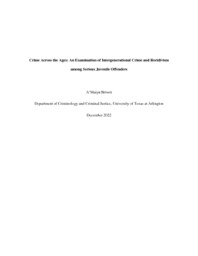
ATTENTION: The works hosted here are being migrated to a new repository that will consolidate resources, improve discoverability, and better show UTA's research impact on the global community. We will update authors as the migration progresses. Please see MavMatrix for more information.
Show simple item record
| dc.contributor.advisor | El Sayed, Sarah | |
| dc.creator | Brown, A'Maiya | |
| dc.date.accessioned | 2023-01-26T16:15:06Z | |
| dc.date.available | 2023-01-26T16:15:06Z | |
| dc.date.created | 2022-12 | |
| dc.date.issued | 2022-12-19 | |
| dc.date.submitted | December 2022 | |
| dc.identifier.uri | http://hdl.handle.net/10106/31030 | |
| dc.description.abstract | Although prior research has studied whether parents and their criminal histories impact a juvenile’s likelihood to commit crime, there has been little examination of whether the criminal histories of family members impact the likelihood of rearrest for juveniles who have already committed serious crimes. Using data from the Pathways to Desistance study (Pathways), this study examines the relationship between the criminal history of family members (i.e., mother, father, and other family members living within the home) and rearrest rates of participants. Results from negative binomial regressions reveal that the arrest records of the mother and father do have a significant relationship with rearrest in young adulthood, while the arrest records of extended family members within the home do not. These findings suggest that juveniles who have mothers or fathers with greater arrest records are at a higher risk of reoffending, and thus, rearrest, as they enter young adulthood. | |
| dc.format.mimetype | application/pdf | |
| dc.language.iso | en_US | |
| dc.subject | Recidivism | |
| dc.subject | Juvenile | |
| dc.subject | Family | |
| dc.subject | Parents | |
| dc.subject | Criminology | |
| dc.subject | Crime | |
| dc.subject | Delinquency | |
| dc.title | Crime Across the Ages: An Examination of Intergenerational Crime and Recidivism among Serious Juvenile Offenders | |
| dc.type | Thesis | |
| dc.date.updated | 2023-01-26T16:15:06Z | |
| thesis.degree.department | Criminology and Criminal Justice | |
| thesis.degree.grantor | The University of Texas at Arlington | |
| thesis.degree.level | Masters | |
| thesis.degree.name | Master of Arts in Criminology and Criminal Justice | |
| dc.type.material | text | |
| dc.creator.orcid | 0000-0002-9902-3733 | |
Files in this item
- Name:
- BROWN-THESIS-2022.pdf
- Size:
- 234.3Kb
- Format:
- PDF
This item appears in the following Collection(s)
Show simple item record


